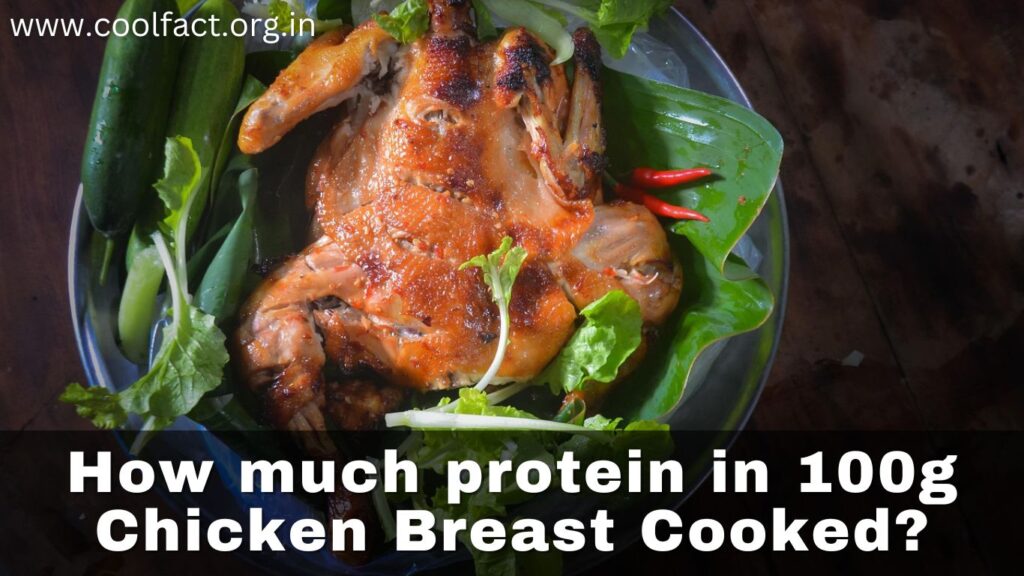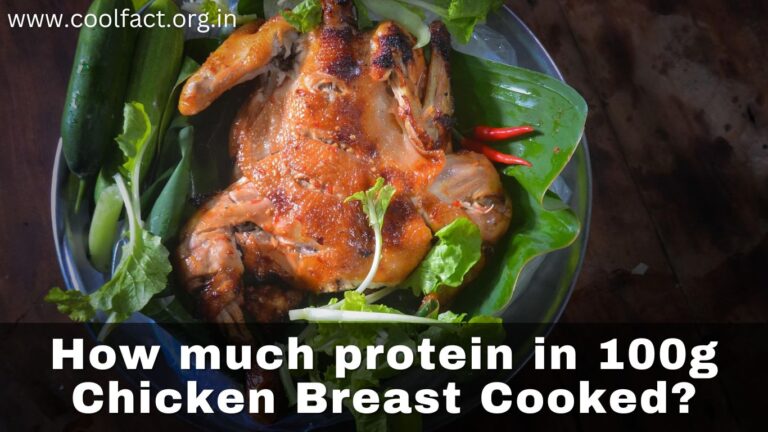Why Chicken Breast Deserves a Spot on Your Plate
Protein in 100g Chicken Breast Cooked: Lean, juicy, and packed with nutrition, chicken breast is one of the most loved and versatile meats in kitchens around the world. Whether you’re a fitness enthusiast, a busy parent, or just someone trying to eat healthier, there’s a high chance that chicken breast has made its way onto your plate. And for good reason—it’s a powerhouse of protein!

But how much protein is actually in 100g of cooked chicken breast? And more importantly, why does that even matter? Let’s uncover the science and benefits behind this popular food choice and how you can make it work for your health goals.
🍽️ Nutritional Value of 100g Cooked Chicken Breast
| Nutrient | Amount (per 100g cooked) |
|---|---|
| Calories | 165 kcal |
| Protein | 31 grams |
| Fat | 3.6 grams |
| Saturated Fat | 1 gram |
| Carbohydrates | 0 grams |
| Fiber | 0 grams |
| Sugar | 0 grams |
| Cholesterol | 85 mg |
| Sodium | 74 mg |
| Potassium | 256 mg |
✅ Chicken breast is virtually carb-free, making it ideal for low-carb and keto diets.
🧬 3 Science-Backed Reasons Why Protein Matters
1. Supports Muscle Repair and Growth
Protein provides amino acids that are essential for building and repairing muscle tissue. After workouts or injury, your body needs protein to recover and grow stronger.
2. Boosts Metabolism
Studies show that high-protein foods increase your metabolic rate more than fats or carbs. This means your body burns more calories digesting protein—an advantage for weight loss and maintenance.
3. Promotes Satiety and Reduces Hunger
Protein-rich meals keep you feeling full for longer. This can naturally reduce calorie intake and prevent unhealthy snacking or overeating.
Also Read:
How Much Protein in 100g Soya Chunks? Unlock Its Nutritional Power
💪 10 Detailed Health Benefits of Eating Chicken Breast
1. High-Quality Lean Protein
Chicken breast provides all nine essential amino acids your body needs, making it a complete protein source without excess fat.
2. Ideal for Weight Management
Low in calories and carbs, it fits perfectly into weight-loss and body-toning diets.
3. Heart Health Support
Skinless chicken breast has low saturated fat, which helps maintain healthy cholesterol levels and supports heart function.
4. Improves Bone Strength
Protein intake is crucial for bone density. Pair it with calcium-rich foods for a bone-friendly meal.
5. Boosts Immune System
The amino acids in chicken support immune function and help produce white blood cells and antibodies.
6. Promotes Healthy Skin and Hair
Protein is essential for the structure and repair of skin and hair. Chicken provides the nutrients needed for glowing skin and stronger hair.
7. Keeps Blood Sugar in Check
With zero carbs and high satiety, chicken helps regulate insulin and blood sugar levels—especially helpful for diabetics.
8. Supports Brain Function
Amino acids from protein support neurotransmitters in the brain, improving focus, mood, and mental energy.
9. Enhances Physical Performance
Athletes and gym-goers rely on chicken to build endurance and strength due to its protein-packed profile.
10. Reduces Fatigue and Tiredness
A balanced protein intake prevents energy crashes and keeps you active throughout the day.
Also Read:
🍗 5 Delicious Ways to Include Chicken Breast in Your Diet
1. Grilled Chicken Salad
Toss grilled strips over mixed greens with olive oil and lemon for a protein-rich lunch.
2. Chicken Stir-Fry
Sauté with veggies and soy sauce for a quick, nutrient-packed dinner.
3. Baked Herb Chicken
Season with garlic, rosemary, and olive oil. Bake to perfection and serve with brown rice or quinoa.
4. Chicken Lettuce Wraps
Skip the carbs by wrapping spicy shredded chicken in fresh lettuce leaves.
5. Homemade Chicken Soup
A comforting way to boost immunity while getting your protein fix.
❓ Top 5 FAQs About Chicken Breast Protein
Q1: Is 100g of chicken breast enough protein for a meal?
Yes! 100g provides about 31g of protein, which is ideal for most adults in one meal.
Q2: Does cooking affect the protein in chicken?
Cooking slightly reduces water content but retains protein levels. Weight changes, but protein per gram remains similar.
Q3: Is chicken breast better than thighs for protein?
Yes, chicken breast has more protein and less fat compared to thighs.
Q4: Can I eat chicken breast every day?
Yes, in moderation and with variety in cooking methods to maintain nutritional balance.
Q5: Is frozen chicken breast less nutritious?
Not significantly. As long as it’s not processed or pre-cooked with additives, it’s a great option.
🏁 Conclusion: Make Chicken Breast Your Protein Partner
Chicken breast is a nutritional superstar—packed with high-quality protein, low in fat, and incredibly versatile. Whether you’re building muscle, losing weight, or just trying to eat healthier, it’s a smart choice to include regularly in your meals.
Looking for more cool and surprising food facts?
👉 Visit us again at coolfact.org.in and stay updated with delicious insights and health-friendly tips!
